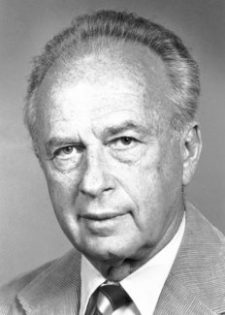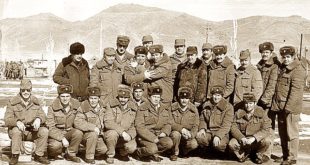Netanyahu and Yitzhak Rabin: The Assassination that shook the world

| Yitzhak Rabin 1922 – 1995Prime Minister of Israel 1974-1977 and 1992-1995 Israel MOD |
Yitzhak Rabin – IDF Chief of Staff, diplomat and the fifth Prime Minister of the State of Israel – was born in Jerusalem in 1922, the son of an ardently labor-Zionist family.
Rabin completed his schooling at the Kadoorie Agricultural High School with distinction and then joined the Palmach – the elite strike force of the Haganah underground defense organization.
He distinguished himself as a military leader early on, during his seven years of service in the Palmach. After the disbandment of this force with the establishment of the State of Israel, Rabin embarked on a military career in the IDF which spanned two decades.
Rising to the rank of Major-General at the age of 32, Rabin established the IDF training doctrine and the leadership style which became known by the command “follow me.” In 1962 he was appointed Chief of the General Staff and promoted to the rank of Lieutenant General. He developed the IDF fighting doctrine – based on movement and surprise – which was employed during the 1967 Six-Day War, when the achievement of air supremacy and massive deployment of armor led to the famous military victory. In January 1968, after 26 years in uniform, Rabin retired from the IDF.
He was appointed Ambassador to the United States in 1968. During his five years in Washington, he strove to consolidate bilateral ties and played a major role in promoting “strategic cooperation” with the United States, which led to massive American military aid to Israel. Rabin returned to Israel in 1973, before the Yom Kippur War. He became an active member of the Labor party; was elected a Member of Knesset in the general elections of December 1973; and was appointed Minister of Labor in the government formed by Golda Meir in March 1974. This government resigned shortly thereafter, and on June 2, 1974, the Knesset voted confidence in the new government formed by Yitzhak Rabin.
Yitzhak Rabin, the first native-born Prime Minister, displayed a leadership style which was candid, direct and at times unadorned to the point of bluntness. He not only had to face the need to rehabilitate the IDF, solve social problems and improve the country’s economy, but also to rebuild public confidence in both the military and the civilian leadership. This task was complicated by domestic scandals, growing industrial unrest and personal rivalry within the government. In 1975, Rabin concluded the Interim Agreement with Egypt, which led to Israeli withdrawal from the Suez Canal in return for free passage of Israeli shipping through the canal. As a result of this agreement, the first Memorandum of Understanding was signed between the Government of Israel and the United States, ensuring American support for Israeli interests in the international arena and renewed American aid.
In July 1976, the government headed by Yitzhak Rabin ordered the “Entebbe Operation” for the rescue of Air France passengers hijacked by terrorists to Uganda. In this daring operation, thousands of miles from home, the hostages were released and flown to safety in Israel. The commander of the operation, Lt.-Col. Yonatan Netanyahu, was killed in the fighting at Entebbe airport.
A no-confidence vote toppled Rabin’s government, sparking new elections. He was nominated to lead Labor in the elections, but disclosure of his wife’s bank account in the USA – an infringement on foreign currency regulations – prompted Rabin to resign from the party leadership prior to the 1977 elections, which swept opposition leader Menachem Begin into office.
During the next two decades, Rabin served as a member of Knesset. For six years (1984-1990), he was Minister of Defense in two national unity governments, engineering security arrangements on the Israeli-Lebanese border that allowed Israeli troops to withdraw to a narrow security zone. Rabin also guided the country’s initial response to the intifada. From March 1990 until June 1992, Rabin served again as an opposition Member of Knesset.
In February 1992 the Labor Party held its first primaries: Rabin was selected Chairman of the Labor Party and, after the election victory in June 1992, began his second tenure as Prime Minister and Minister of Defense.
Rabin’s second term as Prime Minister was marked by two historic events – the Oslo Agreements with the Palestinians and the Treaty of Peace with Jordan . Working closely with Shimon Peres, the Foreign Minister and his longtime rival, he masterminded negotiations on the Declaration of Principles signed with the PLO at the White House in September 1993. This won Rabin, Peres and Arafat the 1994 Nobel Peace Prize and opened negotiations with the Palestinians on autonomy in Gaza and some areas of Judea and Samaria and on the establishment of a Palestinian Authority. Then, in October 1994, a Treaty of Peace was signed with the Kingdom of Jordan. This encouraged the development of ties with additional Arab countries in North Africa and the Persian Gulf.
On November 4, 1995, on leaving a mass rally for peace held under the slogan “Yes to Peace, No to Violence,” Yitzhak Rabin was assassinated by a Jewish right-wing extremist. Age 73 at his death, he was laid to rest before a shocked and grieving nation, in a state funeral on Mt. Herzl in Jerusalem, attended by leaders from around the world.
From the JFK Library:
DAN EPHRON: Yigal Amir had stalked Rabin for about two years, which meant that he had gone– every couple of months he would read in the newspaper that Rabin was going to appear at some public event. And Amir would go there and wait. Three times it happened before the assassination. And each time it happens, something went wrong. Either Amir got there early, or Rabin canceled and didn’t come at all. And Amir saw this as a sign that God didn’t want him to do it at that moment. Or that something would have gone wrong and God saved him by preventing the event from happening.
IRA GLASS: …. the reason why he was killing the prime minister was because of the peace treaty. He saw it as a violation of Jewish law, basically.
DAN EPHRON: Right. So the Oslo peace deals called for Israel to withdraw from parts of the West Bank. And these were staged peace deals, so there was a process where, at the end of the process, certainly the Palestinians hoped they would get a state of their own in all or most of the West Bank and Gaza. For religious Jews or rightwing religious Jews, for many of them anyway, this was really a betrayal of Judaism, because that land, that land certainly in the West Bank and the West Bank and Gaza, to many Jews, is land that God promised to the Jews; it’s the Jewish birthright. And Amir was one of them. He saw what Rabin was doing as a betrayal of Israel and a betrayal of Judaism.
ADDRESS BY ISRAELI PRIME MINISTER YITZHAK RABIN AT THE SIGNING CEREMONY OF THE TREATY OF PEACE BETWEEN THE STATE OF ISRAEL AND THE HASHEMITE KINGDOM OF JORDAN
OCTOBER 26, 1994
[Happy holiday. Happy holiday to the people of Israel; happy holiday to the people of Jordan. Let this be an end to war, violence and hostile activity. And let us know no more war.]Your Majesty King Hussein I,
President Clinton,
President Weizman,
The Foreign Ministers of our countries,
Distinguished guests from all over the world,
The peoples of Jordan and Israel,
From this podium, I look around and I see the Arava. Along the horizon, from the Jordanian side and the Israeli side, I see only a desert. There is almost no life here. There is no water, no well, and not a spring only minefields.
Such were the relations between Israel and Jordan during the last 47 years: a desert. Not one green lear, no trees, not even a single flower.
There comes a time when there is a need to be strong and to make courageous decisions, to overcome the minefields, the drought, the barrenness between our two peoples.
We have known many days of sorrow, you have known many days of grief but bereavement unites us, as does bravery, and we honor those who sacrificed their lives. We both must draw on the springs of our great spiritual resources, to forgive the anguish we caused each other, to clear the minefields that divided us for so many years and to supplant it with fields of plenty.
For nearly two generations, desolation pervaded the heart of our two peoples. The time has now come not merely to dream of a better future but to realize it.
Leaders should clear the path, should show the way, but the road itself must be paved by both peoples. I don’t believe that we would have reached this great moment without the desire for peace in the hearts of both peoples; in the hearts of the soldiers and the intellectuals, in the hearts of the farmers and of the lorry drivers who drive through the Arava highways in Jordan and Israel, in the hearts of teachers and of the little children.
Both nations were determined that the great revolution in the Middle East would take place in their generation.
From this podium, I look around and I see the Arava and I see you: our generation and the next. We are the ones who will transform this barren place into a fertile oasis. The drab browns and the dull grays will burst forth in living vibrant greens.
Your Majesty, Peace between states if peace between peoples. It is an expression of trust and esteem. I have learned to know and admire the quiet and the smiling power with which you guard your nation and the courage with which you lead your people. It is not only our states that are making peace with each other today, not only our nations that are shaking hands in peace here in the Arava. You and I, your Majesty, are making peace here, our own peace, the peace of soldiers and the peace of friends.
President Clinton, Thank you for your tremendous support throughout the entire process, which was vital for the achievement of this final result.
I would like to thank many others on the Israeli side, on the Jordanian side, that worked very hard day and night that we be allowed to reach this great moment. The Foreign Minister of Israel; the head of our team, Elyakim Rubinstein; Ephraim Halevy; and many others that no doubt contributed a lot to this great achievement.
As dawn broke this morning and a new day began, new life came into the world babies were born in Jerusalem. Babies were born in Amman. But this morning is different.
To the mother of the Jordanian newborn a blessed day to you. To the mother of the Israeli newborn a blessed day to you.
The peace that was born today gives us all the hope that the children born today will never know war between us and their mothers will know no sorrow.
Allow me to end by the simple words: Shalom, Salaam, Peace.
VIDEO On Jan. 5, FRONTLINE presents an epic, two-hour documentary from Michael Kirk that goes inside the events that have defined Israeli Prime Minister Benjamin Netanyahu — including his rise to power two decades ago in the wake of the assassination of former Prime Minister Yitzhak Rabin by a right-wing Israeli Jew. Rabin’s widow blamed Netanyahu, then the leader of the conservative Likud party, for contributing to the atmosphere that led to her husband’s death. Netanyahu’s close advisor at the time vehemently disagrees. Go inside this controversial chapter of Netanyahu’s political career in this excerpt from “Netanyahu at War.” (Note: This video was updated on Jan. 10, 2015). Watch “Netanyahu at War” Jan. 5 on PBS and online at a special time — 9/8 central: http://www.pbs.org/wgbh/frontline/fil…
 Soldier of Fortune Magazine The Journal of Professional Adventurers
Soldier of Fortune Magazine The Journal of Professional Adventurers





